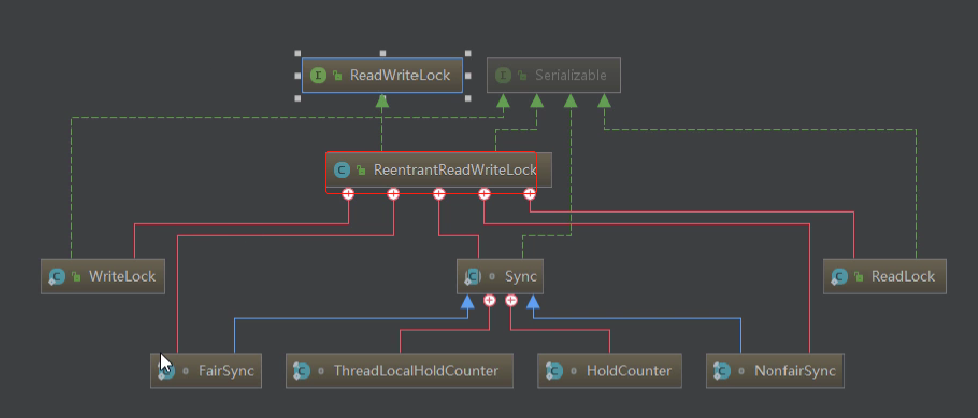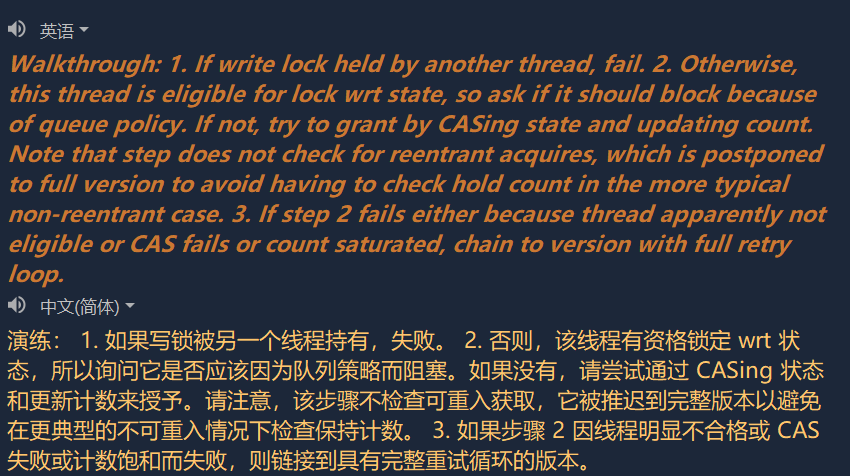锁(七):ReentrantReadWriteLock之读锁源码实现
-
查看类的关系

-
查看读锁方法
public void out(){
readLock.lock();
try {
System.out.println(Thread.currentThread().getName()+"i的值====》"+i + "j的值====》"+j);
}finally {
readLock.unlock();
}
}
- ctrl + 点击lock方法
void lock();
- 查看读锁实现

public void lock() {
sync.acquireShared(1);
}
- 查看acquireShared方法
public final void acquireShared(int arg) {
if (tryAcquireShared(arg) < 0)
doAcquireShared(arg);
}
- 查看tryAcquireShared方法
protected int tryAcquireShared(int arg) {
throw new UnsupportedOperationException();
}
- 查看tryAcquireShared方法的实现

@ReservedStackAccess
protected final int tryAcquireShared(int unused) {
/*
* Walkthrough:
* 1. If write lock held by another thread, fail.
* 2. Otherwise, this thread is eligible for
* lock wrt state, so ask if it should block
* because of queue policy. If not, try
* to grant by CASing state and updating count.
* Note that step does not check for reentrant
* acquires, which is postponed to full version
* to avoid having to check hold count in
* the more typical non-reentrant case.
* 3. If step 2 fails either because thread
* apparently not eligible or CAS fails or count
* saturated, chain to version with full retry loop.
*/
Thread current = Thread.currentThread(); // 获取当前线程
int c = getState(); // 获取状态
if (exclusiveCount(c) != 0 &&
getExclusiveOwnerThread() != current) // 排他锁不为0,且当前线程不是持有锁线程
return -1;
int r = sharedCount(c); // 获取读锁次数
if (!readerShouldBlock() &&
r < MAX_COUNT &&
compareAndSetState(c, c + SHARED_UNIT)) {
if (r == 0) { // 读锁次数为0
firstReader = current;
firstReaderHoldCount = 1;
} else if (firstReader == current) {
firstReaderHoldCount++;
} else {
HoldCounter rh = cachedHoldCounter;
if (rh == null ||
rh.tid != LockSupport.getThreadId(current))
cachedHoldCounter = rh = readHolds.get();
else if (rh.count == 0)
readHolds.set(rh);
rh.count++;
}
return 1;
}
return fullTryAcquireShared(current);
}

- 查看fullTryAcquireShared方法
final int fullTryAcquireShared(Thread current) {
/*
* This code is in part redundant with that in
* tryAcquireShared but is simpler overall by not
* complicating tryAcquireShared with interactions between
* retries and lazily reading hold counts.
*/
HoldCounter rh = null;
for (;;) { // 死循环
int c = getState(); // 获取状态
if (exclusiveCount(c) != 0) { // 判断写锁是否已经被持有了
if (getExclusiveOwnerThread() != current)
return -1;
// else we hold the exclusive lock; blocking here
// would cause deadlock.
} else if (readerShouldBlock()) {
// Make sure we're not acquiring read lock reentrantly
if (firstReader == current) { // if当前线程是读取的线程,则不做任何操作
// assert firstReaderHoldCount > 0;
} else {
if (rh == null) {
rh = cachedHoldCounter;
if (rh == null ||
rh.tid != LockSupport.getThreadId(current)) {
rh = readHolds.get();
if (rh.count == 0)
readHolds.remove();
}
}
if (rh.count == 0)
return -1;
}
}
if (sharedCount(c) == MAX_COUNT)
throw new Error("Maximum lock count exceeded");
if (compareAndSetState(c, c + SHARED_UNIT)) {
if (sharedCount(c) == 0) {
firstReader = current;
firstReaderHoldCount = 1;
} else if (firstReader == current) {
firstReaderHoldCount++;
} else {
if (rh == null)
rh = cachedHoldCounter;
if (rh == null ||
rh.tid != LockSupport.getThreadId(current))
rh = readHolds.get();
else if (rh.count == 0)
readHolds.set(rh);
rh.count++;
cachedHoldCounter = rh; // cache for release
}
return 1;
}
}
}
- 当返回结果小于0
public final void acquireShared(int arg) {
if (tryAcquireShared(arg) < 0)
doAcquireShared(arg);
}
- 执行doAcquireShared方法
private void doAcquireShared(int arg) {
final Node node = addWaiter(Node.SHARED);
boolean interrupted = false;
try {
for (;;) {
final Node p = node.predecessor();
if (p == head) {
int r = tryAcquireShared(arg);
if (r >= 0) {
setHeadAndPropagate(node, r);
p.next = null; // help GC
return;
}
}
if (shouldParkAfterFailedAcquire(p, node))
interrupted |= parkAndCheckInterrupt();
}
} catch (Throwable t) {
cancelAcquire(node);
throw t;
} finally {
if (interrupted)
selfInterrupt();
}
}
- 释放锁
public void out(){
readLock.lock();
try {
System.out.println(Thread.currentThread().getName()+"i的值====》"+i + "j的值====》"+j);
}finally {
readLock.unlock();
}
}
- 查看unlock
void unlock();
-
查看读锁

-
查看releaseShared方法
public final boolean releaseShared(int arg) {
if (tryReleaseShared(arg)) {
doReleaseShared();
return true;
}
return false;
}
- 查看tryReleaseShared方法
protected boolean tryReleaseShared(int arg) {
throw new UnsupportedOperationException();
}
- 查看实现

@ReservedStackAccess
protected final boolean tryReleaseShared(int unused) {
Thread current = Thread.currentThread();
if (firstReader == current) {
// assert firstReaderHoldCount > 0;
if (firstReaderHoldCount == 1)
firstReader = null;
else
firstReaderHoldCount--;
} else {
HoldCounter rh = cachedHoldCounter;
if (rh == null ||
rh.tid != LockSupport.getThreadId(current))
rh = readHolds.get();
int count = rh.count;
if (count <= 1) {
readHolds.remove();
if (count <= 0)
throw unmatchedUnlockException();
}
--rh.count;
}
for (;;) {
int c = getState();
int nextc = c - SHARED_UNIT;
if (compareAndSetState(c, nextc))
// Releasing the read lock has no effect on readers,
// but it may allow waiting writers to proceed if
// both read and write locks are now free.
return nextc == 0;
}
}
- 回到releaseShared方法
public final boolean releaseShared(int arg) {
if (tryReleaseShared(arg)) {
doReleaseShared();
return true;
}
return false;
}
- 当为true时执行doReleaseShared方法
private void doReleaseShared() {
/*
* Ensure that a release propagates, even if there are other
* in-progress acquires/releases. This proceeds in the usual
* way of trying to unparkSuccessor of head if it needs
* signal. But if it does not, status is set to PROPAGATE to
* ensure that upon release, propagation continues.
* Additionally, we must loop in case a new node is added
* while we are doing this. Also, unlike other uses of
* unparkSuccessor, we need to know if CAS to reset status
* fails, if so rechecking.
*/
for (;;) {
Node h = head;
if (h != null && h != tail) {
int ws = h.waitStatus;
if (ws == Node.SIGNAL) {
if (!h.compareAndSetWaitStatus(Node.SIGNAL, 0))
continue; // loop to recheck cases
unparkSuccessor(h);
}
else if (ws == 0 &&
!h.compareAndSetWaitStatus(0, Node.PROPAGATE))
continue; // loop on failed CAS
}
if (h == head) // loop if head changed
break;
}
}

 浙公网安备 33010602011771号
浙公网安备 33010602011771号